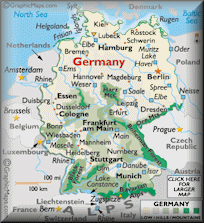-
-

Please Wait...
-
.de German Domain Country Information - .de Germany Country Information
.de

Price and Requirements for .de Domains
Registration Pricing
- 1 Year 6.95 USD
Application Fee
Registration Time Frame
Instant
Requirements
Yes Details Are Individual .de domain registrations allowed?
Yes Details Company or legal entities registrations allowed for .de?
Yes Details Are there requirements, documents, or information needed for .de?
Yes Details Are some .de domain names restricted?
No Details Does .de domain have a special use?
Yes Details Other information I need to know about .de?
No Details Are there any additional fees for .de?
No Details Do I need a trademark/brand name to register .de?
No Details WHOIS Privacy service available?
![]() Trustee / Proxy service offered? Fees?
Yes
Details
Trustee / Proxy service offered? Fees?
Yes
Details
.de Germany Country Information
Germany is a federal parliamentary republic in Europe. The country consists of 16 states while the capital and largest city is Berlin. Germany covers an area of 357,021 km2 and has a largely temperate seasonal climate. With 81.8 million inhabitants, it is the most populous member state and the largest economy in the European Union. It is one of the major political powers of the European continent and a technological leader in many fields.
A region named Germania, inhabited by several Germanic peoples, was documented before AD 100. During the Migration Age, the Germanic tribes expanded southward, and established successor kingdoms throughout much of Europe. Beginning in the 10th century, German territories formed a central part of the Holy Roman Empire. During the 16th century, northern German regions became the centre of the Protestant Reformation while southern and western parts remained dominated by Roman Catholic denominations, with the two factions clashing in the Thirty Years' War, marking the beginning of the Catholic–Protestant divide that has characterized German society ever since.[6] Occupied during the Napoleonic Wars, the rise of Pan-Germanism inside the German Confederation resulted in the unification of most of the German states into the German Empire in 1871 which was Prussian dominated. After the German Revolution of 1918–1919 and the subsequent military surrender in World War I, the Empire was replaced by the Weimar Republic in 1918, and partitioned in the Versailles Treaty. Amidst the Great Depression, the Third Reich was proclaimed in 1933. The latter period was marked by Fascism and the Second World War. After 1945, Germany was divided by allied occupation, and evolved into two states, East Germany and West Germany. In 1990 Germany was reunified.
Germany was a founding member of the European Community in 1957, which became the EU in 1993. It is part of the Schengen Area and since 1999 a member of the eurozone. Germany is a member of the United Nations, NATO, the G8, the G20, the OECD and the Council of Europe, and took a non-permanent seat on the UN Security Council for the 2011–2012 term.
It has the world's fourth largest economy by nominal GDP and the fifth largest by purchasing power parity. It is the second largest exporter and third largest importer of goods. The country has developed a very high standard of living and a comprehensive system of social security. Germany has been the home of many influential scientists and inventors, and is known for its cultural and political history.
Germany is in Western and Central Europe, bordering Denmark in the north, Poland and the Czech Republic in the east, Austria and Switzerland in the south, France and Luxembourg in the south-west, and Belgium and the Netherlands in the north-west. It lies mostly between latitudes 47° and 55° N (the tip of Sylt is just north of 55°), and longitudes 5° and 16° E. The territory covers 357,021 km2 (137,847 sq mi), consisting of 349,223 km2 (134,836 sq mi) of land and 7,798 km2 (3,011 sq mi) of water. It is the seventh largest country by area in Europe and the 62nd largest in the world.
Elevation ranges from the mountains of the Alps (highest point: the Zugspitze at 2,962 metres / 9,718 feet) in the south to the shores of the North Sea (Nordsee) in the north-west and the Baltic Sea (Ostsee) in the north-east. The forested uplands of central Germany and the lowlands of northern Germany (lowest point: Wilstermarsch at 3.54 metres / 11.6 feet below sea level) are traversed by such major rivers as the Rhine, Danube and Elbe. Glaciers are found in the Alpine region, but are experiencing deglaciation. Significant natural resources are iron ore, coal, potash, timber, lignite, uranium, copper, natural gas, salt, nickel, arable land and water.
.de Germany Domain Name - Country Information
| Country Domain | Germany Domain Name .de |
|---|---|
| Country Information | Germany Domain Country Information .de |
| TLD Bulk & Advanced Search | Germany Bulk Domain Registration .de |
| WhoIs Server | .de Whois Server Information |
| Domain Renewals | Renewal German Domain .de |
| Domain Transfer | Transfer Domain .de |
| Domain Hosting | .de Germany Web Hosting |
| SSL Certificates | SSL Certificates |
| Email Services | .de Germany Email Services |
| Domain FAQ | .de Domain Registration FAQ |
Germany Country Information Search Terms
German Domain Country Information German Domain Registrar German World Wide Domain Registration German Country Code Top Level Domain .de Domain Information German Country Information Germany Country Information
























